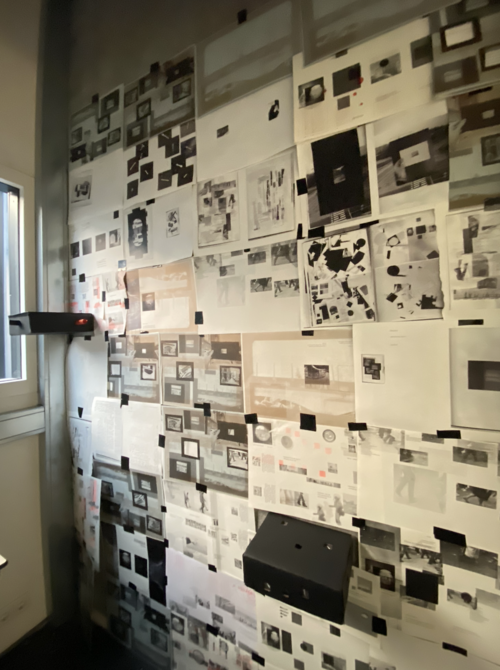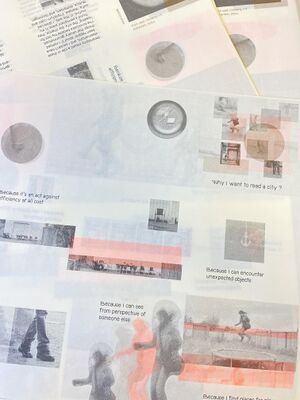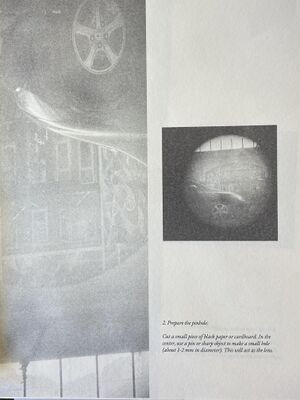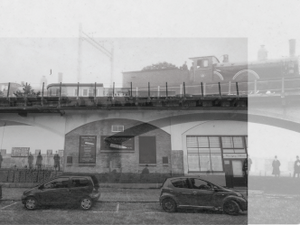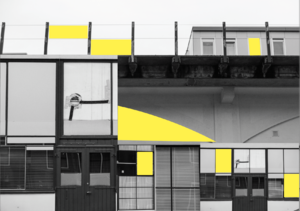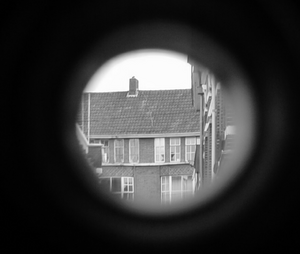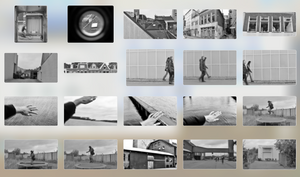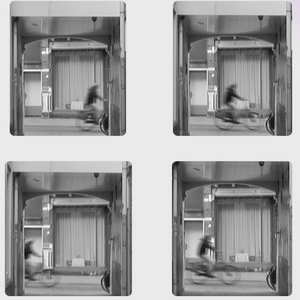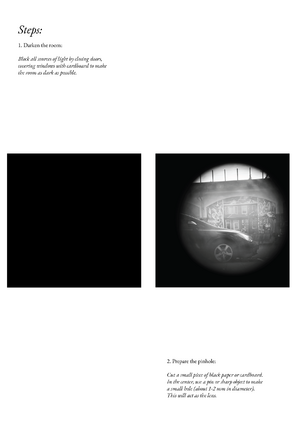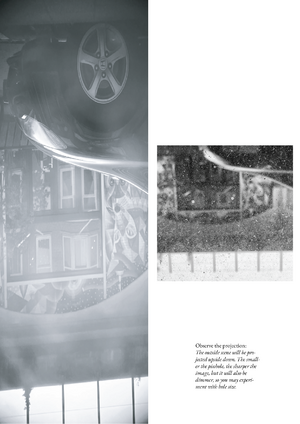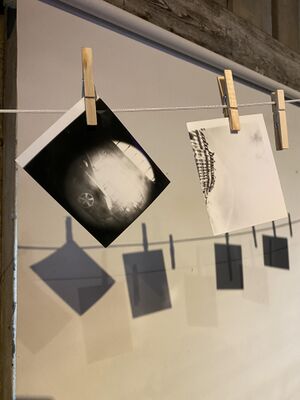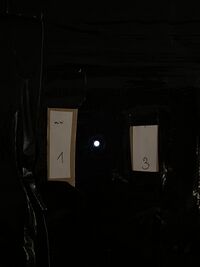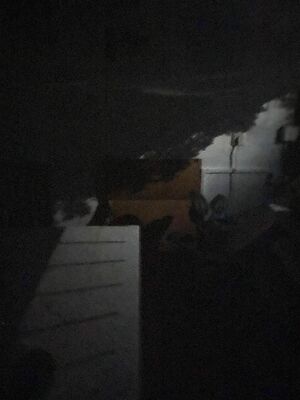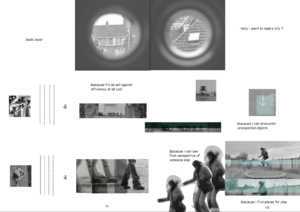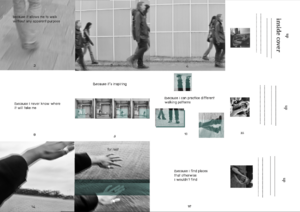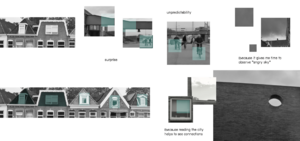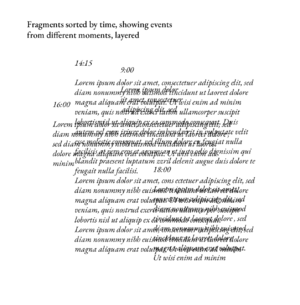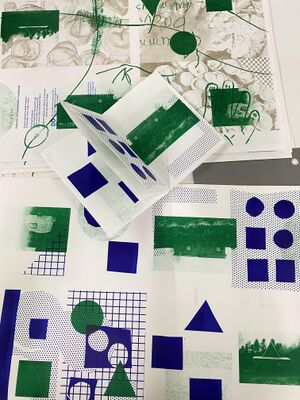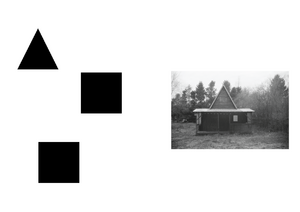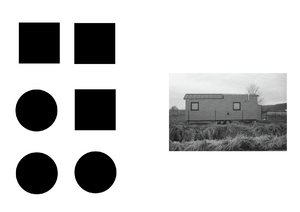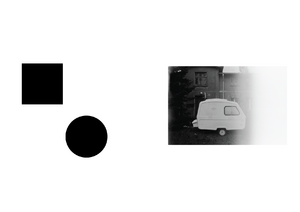User:Mania/Project Proposal - draft and thoughts
Project proposal
What do you want to make?
My final project will be a magazine (Fragments Magazine) that actively engages readers in experiencing and reinterpreting the spaces they inhabit. What makes Fragments a magazine is its collaborative approach, utilizing workshops to create content, which outcomes are meant to invite performative interactions with space. I want to understand how a magazine that is meant to be played outside can influence the way we perceive our surroundings. Therefore Fragments magazine is a repository for paper-based tools that redefines what a magazine is commonly understood to be. By actively existing in public space, it becomes an interface for specific actions and experiences, rather than just a container.
Relation to previous practice
Fragments Magazine will build upon the experience gained in previous semesters. Starting with the research into neighborhoods as learning environments, which I began in the second semester and drawing heavily from the last Special Issue. Fragments Magazine continues the exploration of the theme undertaken during the Scripts to Read the City project, where I tried to create a series of scripts that encourage spontaneous behavior and exploration of space. The result of the work was a device for reading the city and a guide containing scripts that encourage the discovery of opportunities we might encounter and the viewing of the city from someone else’s perspective. Additionally, as part of the project we conducted a series of workshops in which participants wrote their own scripts, and then we walked around the city according to a script written by someone else. For the magazine I utilize the exploration of the relationship between scripted and spontaneous behaviour, the tension between chance and control, and how the simple tool or a script can enhance unpredictability, stimulate imagination and encourage us to observe space with curiosity, as if we were looking from someone else's perspective. Treating this as a foundation, I want to experiment more with printed matter, forming scripts and playing with the physicality of paper, to understand how a magazine can shape the way we perceive our surroundings. This project studies how even the simplest tools, which impose certain limitations, can open us to unexpected opportunities and seeing our surroundings in a new way. It considers magazines as shared resources that help us observe, see differently, and encourage us to question reality. I want to explore the role that self-publishing and distribution might play in this context, by thinking about ways I’ll publish my project to create networks of exchange.
How do you plan to make it?
With the magazine I aim to create a space for chance, surprises and change. It takes a fragment as a starting point for sharing, layering, reconstructing, embracing multiple perspectives to envision different ways of seeing and engaging with our direct environments. I started experimenting by fragmenting what I see on my street to bring certain things to the surface. I began doing this intuitively, arranging pieces into collages. I continued with both image and text, trying to see how isolating certain details changes the understanding of the place. What stories do these fragments tell? Collage and playing with paper come to me intuitively—I even do it for relaxation—but conceptually, something intrigues me about the idea of looking at a city piece by piece. I think we only ever see fragments, and no image of a city is ever complete. It’s this uncovering bit by bit, discovering something unexpected, that excites me about wandering around the city without a plan, without a goal, just seeing what reveals itself to me. Moreover, fragments offer the possibility of connecting them with other fragments, or cutting them into even smaller pieces and turning them into something else. Rearranging them, bringing certain elements to the forefront, gives me a lot of room to reimagine certain things and also to invite others to do this together with me. The way I want to test some of the formats and ideas but also gain knowledge is through giving and participating in workshops. I’m planning to organise a zine making workshop in De Boog, where each participant adds or removes one element and scans a new page, its to test how to make a publication that doesnt just depict the surroundings but engages readers in reinterprating them. I want to use my coloqium as an oppurtnity to test paper based tools. Another method could be a group walk, followed by a conversation to share insights, or handing tools from person to person and changing their instructions to discover a different scenario. I’m planning to dive deeper into situationists approach in order to find methods for playful encounters and interventions to design format for the magazine to exist also outside.
An important part of my practice is experiment with print, for this project I want to explore web to print.
Why do you want to make it?
Everyone is saying to do what excites you. Well, what excites me is working with printed matter. I’m obsessed with Riso printing, and I really enjoy working on publications. I'm curious to explore what a magazine could be if I think of it as something to be read outdoors or used as a tool, and what it could bring to urban spaces. After completing the Scripts to Read the City project, I find the question of what perspectives artistic research can bring to urban spaces very relevant. I love cities and I am interested in projects rooted in this context. This summer, I attended a summer school focused on urban space as a place for various (un)learning practices, activating different modes of knowing, sensing, and being/becoming together. I met people from urban studies, researchers, and other artists interested in participatory urban interventions, and I think that these connections could also help me now, by providing constructive conversations. I want to combine the topic of urban space with the format I love—publications, specifically a magazine. I feel that with this format, I’ll be able to continue this project even after graduation. I want this project to bring me closer to zine festivals, other zine makers, and printed matter enthusiasts. At the same time, I really want to create a website, even though I’m terribly stressed that I’m not very skilled at it. Still, I want to learn new things and experiment with how code could strengthen my work.
Who can help you and how?
I can definitely count on the people from De Boog—they always look for ways to do things together. I’m planning to run a workshop there, and their help will be very valuable. I think that if I go forward with an open call for the magazine, participants I met during the Viadrinicum summer school might be interested in taking part in it. I thought of reaching out to some of them to conduct short interviews, which could be inspiring for finding the right approach to public space interventions in terms of ways to publish the magazine. Other than that I really need help from tutors to master web-to-print. And most importantly some emotional support from other students and friends.
What is your time table?
Still have some doubts about the workflow and how to approach the website and how the printed magazine. I think I would like to work on one thing for once instead of jumping between 17 tasks like I usually do.
September;
- continuation of the project Scripts to read the city, leading workshop in Groningen
October:
- Experiments with camera obscura, paper frame, photographs and collages, fragmenting
November:
- zine fest in Amsterdam - showing zines in process
- Public moment
- Coloqium
- start with the website
- Finalizing project proposal and research outline
December
- Find a way exaclty how I envision the website and its purpose
- Assesment
- Website contination
January
- Workshop
- Website draft
February
- draft of the magazine - formats to exist outdoors
March
- open call ?
- website
April
- magazine design
May
- magazine production
Fragment of text about fragments
What is a fragment? What is a collection of fragments? Fragments can be combined, cut into smaller fragments, rearranged, juxtaposed. What is revealed by the scattered fragments on my desk? What is emerging? So far only a mess.
Deconstruction and reconstruction. These fragments will take a different form in the form of a zine, magazine or film.
What interests me about these fragments is how easily they can be arranged in a different way. Act of becoming something else. Till now I focused on a landscape that I'm unfolding. We only see fragments of reality. Maybe by bringing them together we can celebrate our individuality and differences. But what I want to explore more is cutting, fragmenting and rearranging as a potential to construct something different or show what we demand from reality.
In so many areas of everyday life, cutting tools are used to build something else. The entire film is made of cut fragments. Hair cutting scissors. Tools for cutting wood used to build furniture. How it relates to the publishing theme? What would happen if leave a publication not bound and allow readers to rearrange the order?
Tools have mannuals, and those can be easily rewritten for a tool to serve a different purpose. So in a way they can stay open for interpretations.
V3
- pop up paper tools for observation
- rearranging fragments
- book as an object
- Vision, perception, and representation
-Image/Reimaginimng ....by changing the order of the fragments
- The image of the city/ ever incomplete/ what we demand from reality?
- paper tools and manuals allowing multiple exchanges
- how can I connect to the city by "reading" it with others
References, readlist:
- Beautiful Data: A History of Vision and Reason since 1945 by Orit Halpern
- Roland Barthes Camera Lucida
- Peter Olpe Out of focus
- Radical Technologies: The Design of Everyday Life by Adam Greenfield
- Nature Study Notes
- Future Books, Sharing ideas on book and art publishing
- Publishing manifesto https://missread.com/publication/publishing-manifestos/
V2
What do you want to make?
- general introduction ( what is it, a book? A film, an instalation What audiance it aim for, what location, describe any specifics you can
A magazine that has several issues and forms a continuation. It does not begin with the intention of ultimately reaching a specific destination, but rather takes the form of continuous observation, exchange, conversation, layering, searching for meanings, adding notes, jotting between the lines, fragmenting images, and rearranging them anew.
The magazine focus on the act of observing and participating by displaing fragments of reality noticed through simple paper machines/ devices, viewing frames.
I wold like to opened up the potential for different narratives. Without favoring any of them, simply giving space for everyone to share what we see and how the myriads of stories constitute an urban environment.
How do you plan to make it?
How you will go about conducting your research and practice ( COMBINING, READING, WRITING AND PRACTICE) steps ill make to realise it Steps what steps ill take to realise it
- Paper machines devices
- Turn a room into camera obscura ( seeing, participation, describing what you see and checking with others what they see)
- Join a workshop on collective writing
- Invite people to play with paper machines, consider what we are paying attention to
- Work on a magazine
What is your time table
Steps and how it tranlstate to timetable Order in which thinks will be done
Think about your audience, how you will approach them Include that in your plan
Why do you want to make it?
What might other people find relevant about this project ?
I’m drawn to zine festivals, to playing with paper, images, and text. To quick, spontaneous zines, made together with others because they bring so much fun. I love festivals around printed matter and how they create a community of people sharing a common passion, while also contributing to the decentralization of knowledge, exchanging references, inspiring each other, and learning from one another. I love this environment and want to derive from it, but also be a part of it.
Why I want to read a city?
Because it allows me to walk without any apparent purpose
Because its an act againts efficiency at all cost
Because I can encounter unexpected objects
Because I never know where it will take me
Because it's inspiring
Because I can practice different walking patterns
Because I can see from perspective of someone else
Because I can find places for play
For reflection
For rest
Because I find places that otherwise I woulnt find
Because it encourages me to talk with strangers
Because there is so much beauty
Because I want friction
Surprise
Unpredictability
Because it made me notice houses that look like they are hugging the one in the middle
Bacause reading the city helps to see connections
Because I can notice others who are present in the space
Because it gives me time to observe "angry sky"
Because it allows to learn from each other
I'm intrested in collective resistance against efficiency, and success at all costs. In spaces collectively organised, shifting towards care, generosity, and attention rather than efficiency and perfection. Maybe a sense of humour and unlearning practices can help us mobilize us collectively, embrace differences and celebrate our individuality. Therefore I find it important to question how we learn and from whom. Thats why for now I want to continue with the topic of Learning City, and the question of how knowledge production can be more horizontal.
I'm curious what can be done through text. I'm inspired by uncreative writing where words are shared, reused, recycled, duplicated, gifted, reorganized. How the layering of these words can serve to overturn hierarchies and seek new meanings. How these words can convey someone's individual experience.
Who can help you and why?
Anyone that can help you with the project Stimlate you to think about the network around you that can help you with that project
De Boog - people that share passion for print and doing things together
Friends from the summer school - to critically reflect upon the experiences of (un)learning as a factor of urban transformation
Afke Mertens from Riso Pop Amsterdam - potential workshop or collaboration
Relation to previous practice
How it builds upon the previous practice
The topic of Learning city - I see it as a continuation of themes that last year that I still want to learn more about \
Relation to a larger context
Whre you situate your work in relation to other aryists or theory
Paragraph where you can pinpoint atoms of what is out there, showing the awareness of broasder context
References
Works taht inform your work Bibliography Use harvard method
Rapid prototypes
How to turn a room into a camera obscura
Fragments - Unfolding the landscape
Observing a square
Shapes
Thoughts
9.10
I spent the whole summer looking through binoculars that I found at the market for 3 euros. Totally absorbed by this, I spent hours on Yana's balcony, observing the rooftops in Sofia. Textures, antennas, edges. I watched as the details of the city were revealed to me. Chance settled in during these observations, and I am extremely happy about it. Things were revealed to me that easily go unnoticed. Binoculars have become a tool for reading the city. The chances would settle in for good. In this way I observed Sofia, Warsaw, Frankfurt-Oder and Słubice, Rotterdam and Groningen
Even though this beloved tool made me feel like I was watching a documentary, I had my doubts whether I was really getting to know the city better through the act of observing? I started to think maybe it was just staying on the surface, maybe I should talk to the people I saw. I felt I had to prove that reading a city is not just an act of observing from a distance. After all, the more I observe, the more I realize how complex and multi-layered cities are and how many different stories they contain.
For me, reading a city means being interested in other people and what surrounds you. It means being open to the chances that may present themselves to you and welcoming them into your process. It means participating in this world and continuosly changing how you perceive it.
So for everyone who thinks that observation is a cold act, and mostly for myself to validate my process, here is why I want to read the city:
Because it allows me to walk without any apparent purpose Because its an act againts efficiency at all cost Because I can encounter unexpected objects Because I never know where it will take me Because it's inspiring Because I can practice different walking patterns Because I can see from perspective of someone else Because I can find places for play For reflection For rest Because I find places that otherwise I woulnt find Because it encourages me to talk with strangers Because there is so much beauty Because I want friction Surprise Unpredictability Because it made me notice houses that look like they are hugging the one in the middle Bacause reading the city helps to see connections Because I can notice others who are present in the space Because it gives me time to observe "angry sky" Because it allows to learn from each other
21.09
On the train to the exhibition, I sketched out paper machines for observation, experiments with the camera obscura, cut-out fragments of photos, I read about Bruno Munari, did few collages, and with the frames from this summer and fragments of recordings from Groningen in front of my eyes, I came to the conclusion that my subject is about seeing and observing. I got scared because when I said it out loud, it sounded trivial. How is it about seeing? What is worth seeing?
Does the act of choosing these fragments, placing them in a pblication, their materiality justify and confirm their importance? What is worth seeing, what should be shown to others? This process should be redistributed without exclusion, because, after all, self-publishing is about the possibility of presenting anything you think is worth seeing. I would like to step away from the dominant narrative, not focus on a single topic, because it's easy to eliminate even the most interesting things that don't fit into the imposed framework of the subject.
I'm interested in observing what happens before my eyes without bending reality to fit into my topic. I am inspired by observational cinema and getting to know a place through a camera. There isn't one correct interpretation, and I'm fascinated by the multitude of these narratives and interpretations, not prioritizing any of them. This relates both to the subject of seeing and to the question of self-publishing.
By asking what is worth seeing, what would you want to show others, whether it would be a burning question or perhaps something less serious, I wold like to opened up the potential for different narratives. Without favoring any of them, simply giving space for everyone to share what we see and how the myriads of stories contitte an urban environment.

